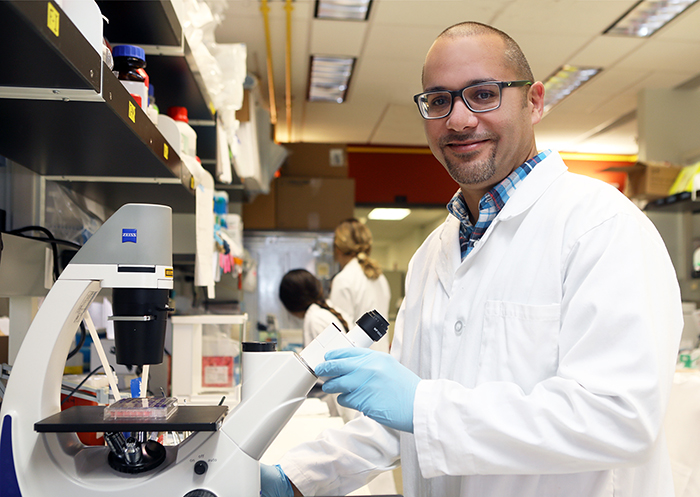NIH Awards $2.7M Grant to UTEP Biology Professor to Study AIDS-associated Fungal Meningitis
Last Updated on August 13, 2019 at 12:00 AM
Originally published August 13, 2019
By UC Staff
UTEP Communications
The National Institutes of Health recently awarded a $2.7 million grant to Luis R. Martinez, Ph.D., associate professor of biological sciences at The University of Texas at El Paso, to study a potentially life-threatening fungus and suggest possible treatments.

Martinez will investigate the basis for Cryptococcus neoformans, a fungus that invades the central nervous system (CNS), which controls many body functions. If it infects the lungs, it could develop into pneumonia for patients with weakened immune systems. It is the most common cause of fungal meningitis amongst AIDS patients.
The UTEP professor said he became intrigued with this fungus as a doctoral student. He noted how the fungus led to tumor-like lesions on brain tissue of affected patients. The fungus, which resides in animals, plants and bird excrement, could infect people who inhale the fungal spores. Cryptococcal meningitis starts with flu-like symptoms but can be fatal if not treated quickly. Findings could prolong and improve the life of those affected.
“If we understand the predilected route C. neoformans uses to enter the brain, we can develop therapeutics to block this process,” Martinez said. “Also, by understanding microglial function – the immune cells of the CNS – during C. neoformans brain infection, we can design therapeutics to stimulate these cells to combat fungal colonization of the CNS.”
Martinez is the principal investigator of the five-year project. He uses high-resolution microscopy, mass spectrometry, histology, cell biology and immunological techniques at his UTEP research lab.
His UTEP collaborators are Igor Almeida, D.Sc., professor of biological sciences, and Arshad Khan, Ph.D., associate professor of biological sciences. Other teammates include Michael Dores, Ph.D., assistant professor of biology at Hofstra University in Hempstead, New York; and Eliseo Eugenin, Ph.D., associate professor in the Department of Neuroscience, Cell Biology and Anatomy at The University of Texas Medical Branch at Galveston.